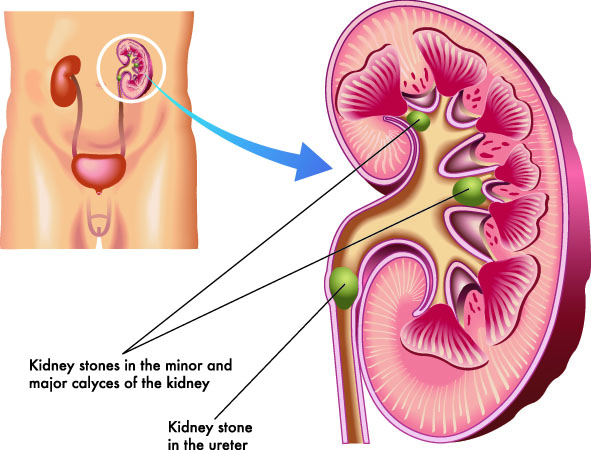Kidney Stones vs UTI: Professional Insights on Effects, Diagnosis, and Administration
Kidney Stones vs UTI: Professional Insights on Effects, Diagnosis, and Administration
Blog Article
Checking Out the Symptoms and Causes of Kidney Stones in Contrast to Urinary Tract Infections: A Detailed Guide
The exploration of kidney rocks and urinary system system infections (UTIs) reveals a complex interaction of symptoms and underlying reasons that require mindful assessment. While both problems can result in hematuria, they offer unique scientific features and occur from various etiological elements. Recognizing the subtleties of each condition is crucial for effective diagnosis and monitoring. What are the vital distinctions in their symptoms, and how might these notify therapy techniques? The response to these inquiries might offer essential insights right into the prevention and care of these usual urological concerns.
Overview of Kidney Stones
Kidney stones, also called renal calculi, form when certain compounds in the urine crystallize and accumulation, bring about the development of hard down payments within the kidneys. These rocks can vary in size, varying from a grain of sand to a golf sphere, and can be made up of various products, the most typical being calcium oxalate, uric acid, struvite, and cystine. The formation of kidney stones is affected by several factors, consisting of nutritional routines, fluid consumption, and genetic tendency.
Symptoms of kidney rocks might include serious pain in the back or side, blood in the pee, nausea, and constant urination, particularly as the stone moves with the urinary system. Medical diagnosis generally includes imaging studies such as ultrasound or CT scans, along with urinalysis to recognize the stone's make-up.
Treatment choices differ based upon the dimension and type of stone, as well as the severity of signs and symptoms (Kidney Stones vs UTI). Tiny stones may pass naturally with enhanced liquid intake, while bigger rocks may call for medical interventions such as lithotripsy or medical removal. Recognizing the pathophysiology and threat factors connected with kidney stones is vital for reliable prevention and administration
Summary of Urinary System Infections
Urinary system infections (UTIs) are common bacterial infections that impact any type of part of the urinary system, including the kidneys, ureters, bladder, and urethra. They primarily happen when germs, commonly from the stomach system, enter the urinary system, leading to inflammation and infection.
The prevalence of UTIs is significantly greater in ladies than guys, largely as a result of physiological distinctions, such as a much shorter urethra. Threat variables consist of sex-related activity, certain contraceptive methods, urinary system retention, and dehydration. The diagnosis of UTIs is usually confirmed via pee tests, which may expose the existence of germs, white blood cells, or red blood cells.

Symptoms of Kidney Stones
The pain related to kidney stones can materialize in numerous ways, typically leading people to seek clinical focus. Among one of the most usual signs is serious pain, generally local in the reduced back or side, which may emit to the abdomen or groin. This pain, often defined as sharp or cramping, can occur unexpectedly and might fluctuate in intensity.
Additionally, individuals might experience hematuria, or blood in the pee, which can vary from tiny amounts to noticeable discoloration. This symptom might be accompanied by changes in urinary practices, such as raised frequency or urgency, as well as pain during peeing. Queasiness and vomiting are additionally common, often resulting from the body's reaction to extreme discomfort.
Sometimes, individuals might experience fever and cools, especially if a second infection develops due to the blockage brought on by the rocks. Overall, the mix of severe pain, hematuria, transformed urinary system patterns, and stomach signs and symptoms can published here offer significant understanding into the visibility of kidney stones, warranting timely medical evaluation and treatment. Comprehending these signs is essential for prompt medical diagnosis and efficient monitoring of the condition.
Signs of Urinary System Tract Infections
Infections within the urinary system tract frequently provide an array of distinctive symptoms that can significantly impact life. The most common signs include a consistent impulse to urinate, usually gone along with by a burning sensation throughout urination, called dysuria. Individuals might also experience enhanced regularity of urination, producing percentages of urine each time.
Other noteworthy signs and symptoms consist of cloudy or reeky pee, which may suggest the existence of microorganisms or pus. In some cases, pee might appear red or pink due to the presence of blood, a problem known as hematuria. Furthermore, people might experience pelvic pain or pressure, which can even more worsen the sensation of seriousness.
Systemic signs and symptoms might likewise show up, such as high temperature, cools, and exhaustion, specifically if the infection has actually ascended to the kidneys. It is vital to identify these signs and symptoms early, as untreated urinary system tract infections address can bring about much more extreme complications. Kidney Stones vs UTI. Prompt medical interest is encouraged when these signs are observed, enabling for suitable analysis evaluation and therapy to relieve discomfort and protect against additional health and wellness concerns
Sources Of Each Problem
Regularly, kidney rocks and urinary system tract infections arise from distinct yet sometimes overlapping reasons that can impact individuals in different ways. Kidney rocks typically form as a result of metabolic factors, dietary options, and genetic tendencies. Increased degrees of calcium, oxalate, or uric acid in the pee can bring about stone development. Dehydration, insufficient liquid intake, and high-sodium diet plans can aggravate these conditions, advertising condensation within the urinary system tract.

Comprehending these unique reasons is important for prevention and treatment. Kidney Stones vs UTI. While way of life alterations may alleviate the threat of kidney rocks, proper health and punctual treatment of urinary system tract infections are important for lowering their reappearance and connected difficulties
Conclusion
In summary, kidney rocks and urinary tract infections existing unique signs and symptoms and underlying causes. Kidney stones are defined by serious discomfort and metabolic elements, while urinary tract infections largely involve bacterial infections causing urinary system necessity and discomfort. Both problems can result in hematuria, their formation mechanisms vary substantially. Comprehending these distinctions is essential for effective medical diagnosis and therapy, eventually improving person results for those impacted by either condition.
The expedition of kidney rocks and urinary system infections go to my blog (UTIs) discloses a complex interplay of symptoms and underlying causes that call for cautious examination.Urinary system system infections (UTIs) are common bacterial infections that influence any kind of part of the urinary system, consisting of the kidneys, ureters, bladder, and urethra.Regularly, kidney stones and urinary system system infections develop from distinct yet sometimes overlapping causes that can affect individuals in a different way.In summary, kidney rocks and urinary system tract infections present distinct signs and underlying causes. Kidney stones are identified by severe pain and metabolic variables, while urinary system system infections largely involve microbial infections leading to urinary urgency and discomfort.
Report this page